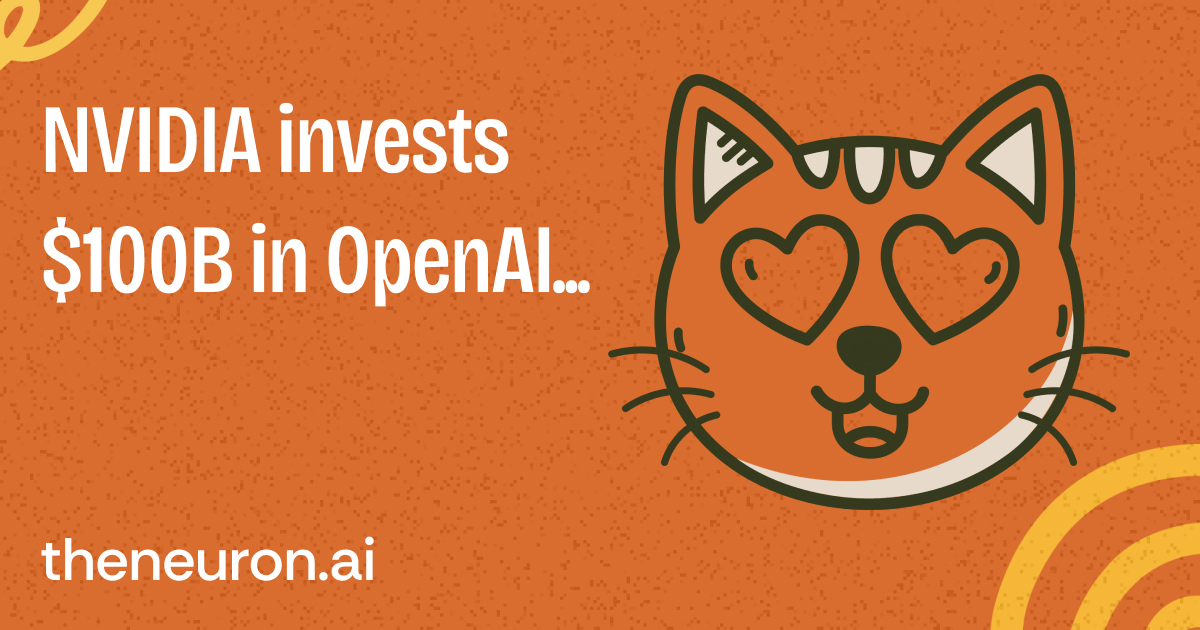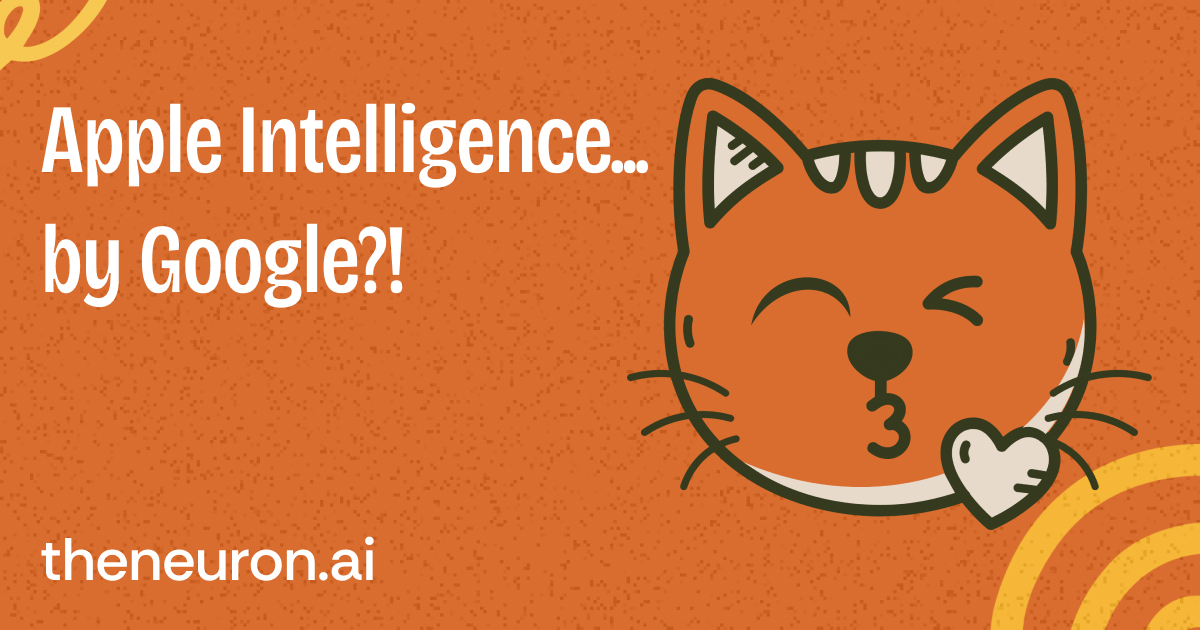Welcome, humans.
AI filmmaker Dinda Prasetyo just released “Skyland,” a fantasy short film about a guy named Aeryn and his “loyal flying fish”, and honestly, the action sequences look like they belong in an actual film…
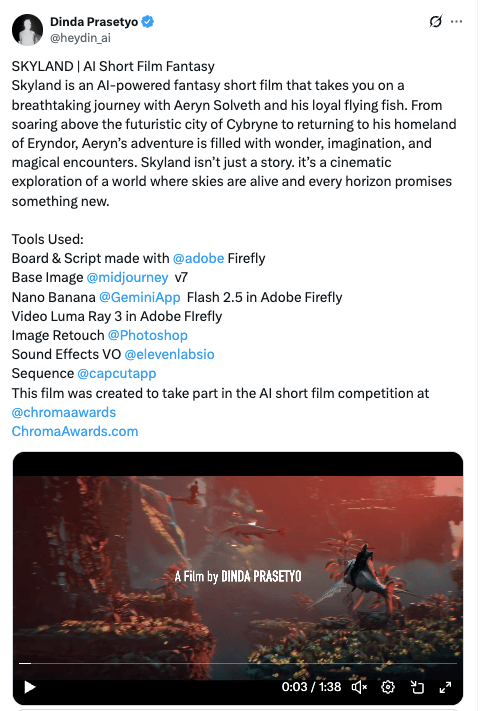
What's wild is that Dinda used a cocktail of AI tools (Adobe Firefly, MidJourney, the newly launched Luma Ray 3, and ElevenLabs) to create something that would've required a full production crew just two years ago.
The real breakthrough? Fight scenes that don't look like two robots having an awkward dance-off. Luma Ray 3 in particular seems to finally “get” dynamic motion and fast cuts (and here’s the prompt Dinda used to create these scenes; he also shared a comparison of all the top video models and how they did at the same fight prompt).
Even wilder? The entire visual concept was created from a single Midjourney image that he then developed into a full cinematic world using Nano Banana and Adobe Firefly Boards.
This feels like one of those moments where AI video crosses from “impressive tech demo” to “wait, that actually looks legit.” Sure, Marvel Studios isn’t getting replaced overnight, but when a solo creator can create cinematic fantasy sequences from their laptop (and an entire visual aesthetic from a SINGLE frame), we're definitely not in Kansas anymore, Toto. Or should we say, we're not in Cybryne anymore…
Here’s what happened in AI today:
- NVIDIA and OpenAI announced $100 billion partnership for AI datacenters.
- 1X Technologies plans $1B raise to compete in humanoid robots.
- Perplexity launched Email Assistant for Gmail/Outlook.
- Luxshare allegedly building OpenAI consumer device.

NVIDIA Just Bet $100 Billion on OpenAI's Future…
So like, remember when $40 billion felt like a massive AI investment? That’s nothing, y’all. NVIDIA and OpenAI just announced a new partnership that makes every previous AI deal look like pocket change: NVIDIA plans to invest up to $100 billion in OpenAI to build 10 gigawatts of AI datacenters.
Here's what this monster deal includes:
- 10 gigawatts of NVIDIA systems (that's millions of GPUs, NVIDIA’s AI chips).
- Up to $100B investment from NVIDIA, paid progressively as each gigawatt comes online.
- First deployment in late 2026 ,using NVIDIA's Vera Rubin platform.
- This is all to help the 700M weekly active users already on OpenAI's platform get reliable access to top tier intelligence.
So like, how much power is 10 gigawatts? Let’s put that in perspective:
- As we wrote Sunday, 1 gigawatt = one nuclear power plant’s worth of power.
- So 10 gigawatts could power ~7.5 million homes.
- Instead, it's going to power millions of GPUs to train OpenAI's next-generation models on their path to what they're calling “superintelligence.”

Why this matters: The partnership kicks off in the second half of 2026 with NVIDIA's new Vera Rubin platform. OpenAI will use this massive compute power to train models beyond what we've seen with GPT-5 and likely also power what’s called inference (when you ask a question to chatGPT, and it gives you an answer). And NVIDIA gets a guaranteed customer for their most advanced chips. Infinite money glitch go brrr am I right? Though to be fair, this kinda deal is as old as the AI industry itself.
This isn't just about bigger models, mind you: it's about infrastructure for what both companies see as the future economy. As Sam Altman put it, “Compute infrastructure will be the basis for the economy of the future.”
Also, it looks like there’s some “compute-intensive” new product offerings coming soon, with “additional fees” to power “interesting new ideas.”
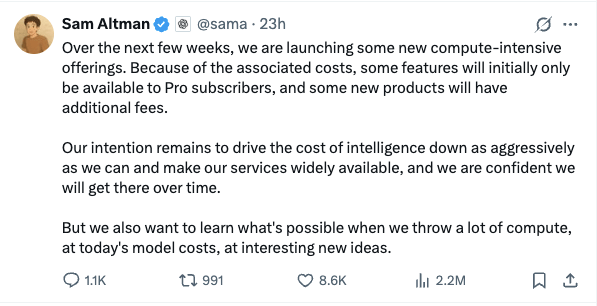
Likely, that includes the new training technique of RL environments where AI models actually use fake versions of apps to learn how to do complicated tasks.
And as Sam pointed out in this viral CNBC clip, solving the compute bottleneck could be the difference between having to choose between 1. curing cancer OR providing free education for everyone on Earth… or 2. being able to do BOTH.
Well when you put it that way…
Our take: We think this news is actually super interesting when you pair it with the other big headline from today: Commonwealth Fusion Systems signed a commercial deal worth more than $1B with Italian energy company Eni to purchase fusion power from their 400 MW ARC plant in Virginia. Here’s what that means for AI…

FROM OUR PARTNERS
CodeRabbit: Free AI Code Reviews in CLI
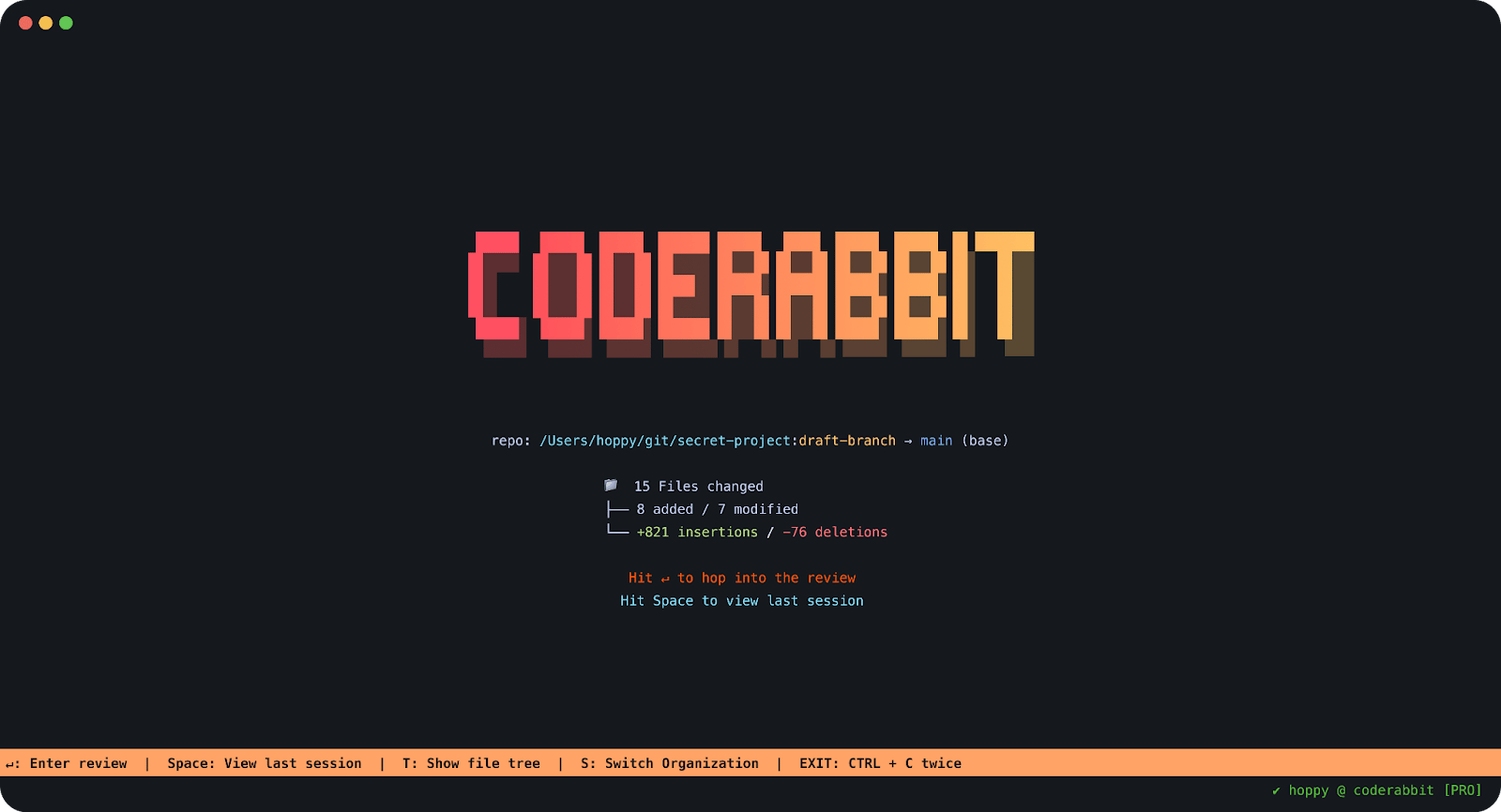
CodeRabbit CLI is an AI code review tool that runs directly in your terminal. It provides intelligent code analysis, catches issues early, and integrates seamlessly with AI coding agents like Claude Code, Codex CLI, Cursor CLI, and Gemini to ensure your code is production-ready before it ships.
- Enables pre-commit reviews of both staged and unstaged changes, creating a multi-layered review process.
- Fits into existing Git workflows. Review uncommitted changes, staged files, specific commits, or entire branches without disrupting your current development process.
- Reviews specific files, directories, uncommitted changes, staged changes, or entire commits.
- Flags hallucinations, code smells, security issues, and performance problems.

Prompt Tip of the Day
We keep seeing lots of unique content around Nano Banana, like this GitHub repo shared by X user Machina. The repo has 90+ case studies of different types of images and image edits you can create with nano banana, along with the exact prompts used.
You can then take any of those prompts, copy and paste it into with your favorite AI tool, and ask it to update the prompt for your specific use-case.
If you’re not good at writing what you want, use voice mode and talk through the type of image you want to create (or the edit you want to make to an existing image), and then ask it to update the prompt you provided “as close to the original prompt as possible” to your new image. Then just add your image and new prompt and you’re set!
Machina also shared another cool video of a guy who shares how to build an image model workflow in n8n with both Nano Banana and the new Seedream 4.0 model from ByteDance, so you can take these prompts and turn them into automations. V cool!

Treats to Try
*Asterisk = from our partners (only the first one!). Advertise in The Neuron here.
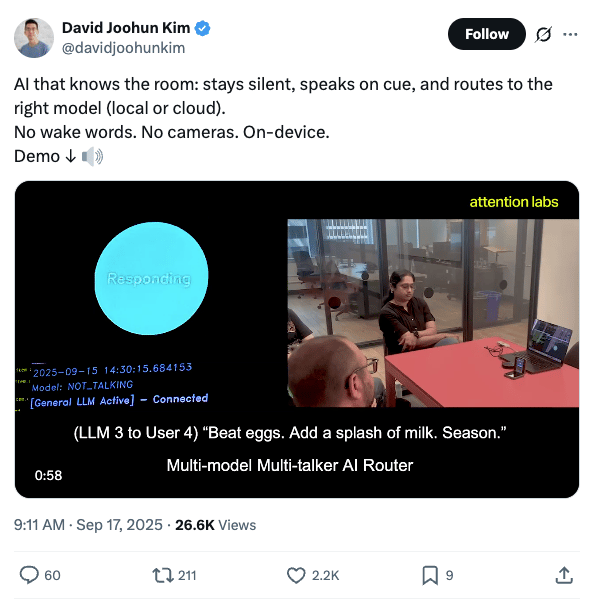
- *Attention labs unveils the missing layer for human–AI interaction: agents that know when to listen, speak, or stay silent. Watch the demo.
- Qwen3-Omni from Alibaba lets you chat with one model using text, images, audio, and video all together, so you can upload a video of your cooking and ask it to explain what went wrong or have a voice conversation about it (model weights, try it here).
- Higgsfield Animate (powered by Wan 2.2) lets you replace any actor in video footage with someone else using just one photo—upload a film clip, upload the replacement actor's photo, and it swaps them while preserving camera motion (demo).
- Distyl automates your enterprise workflows with AI systems that plug directly into your existing operations (raised $175M).
- DeepSeek-v3.1-Terminus helps you with coding projects and search tasks while delivering more consistent language and reliable outputs (GGUF version).

Around the Horn
- 1X Technologies, maker of humanoid robot Neo, plans to raise $1B to compete with Figure, who recently announced over $1B in “committed capital” for its own humanoid robots and Helix AI platform.
- Perplexity announced an Email Assistant for Gmail/Outlook that drafts replies, triages, and schedules meetings (Max tier only).
- Luxshare allegedly signed on to build an OpenAI “consumer AI device”, according to supply-chain rumors.
- Google began the rollout of Gemini into Google TV, starting with TCL's QM9K series, with more devices coming in 2025 (demo of what this look like).
- Meta will bring an AI assistant to Facebook Dating with tailored matches and a weekly “Meet Cute” surprise feature.
- The Oakland Ballers let an AI manage the team for a game; it mirrored the coach's calls, sparked backlash, and likely won't be repeated.

FROM OUR PARTNERS
How Canva, Perplexity and Notion turn feedback chaos into actionable customer intelligence
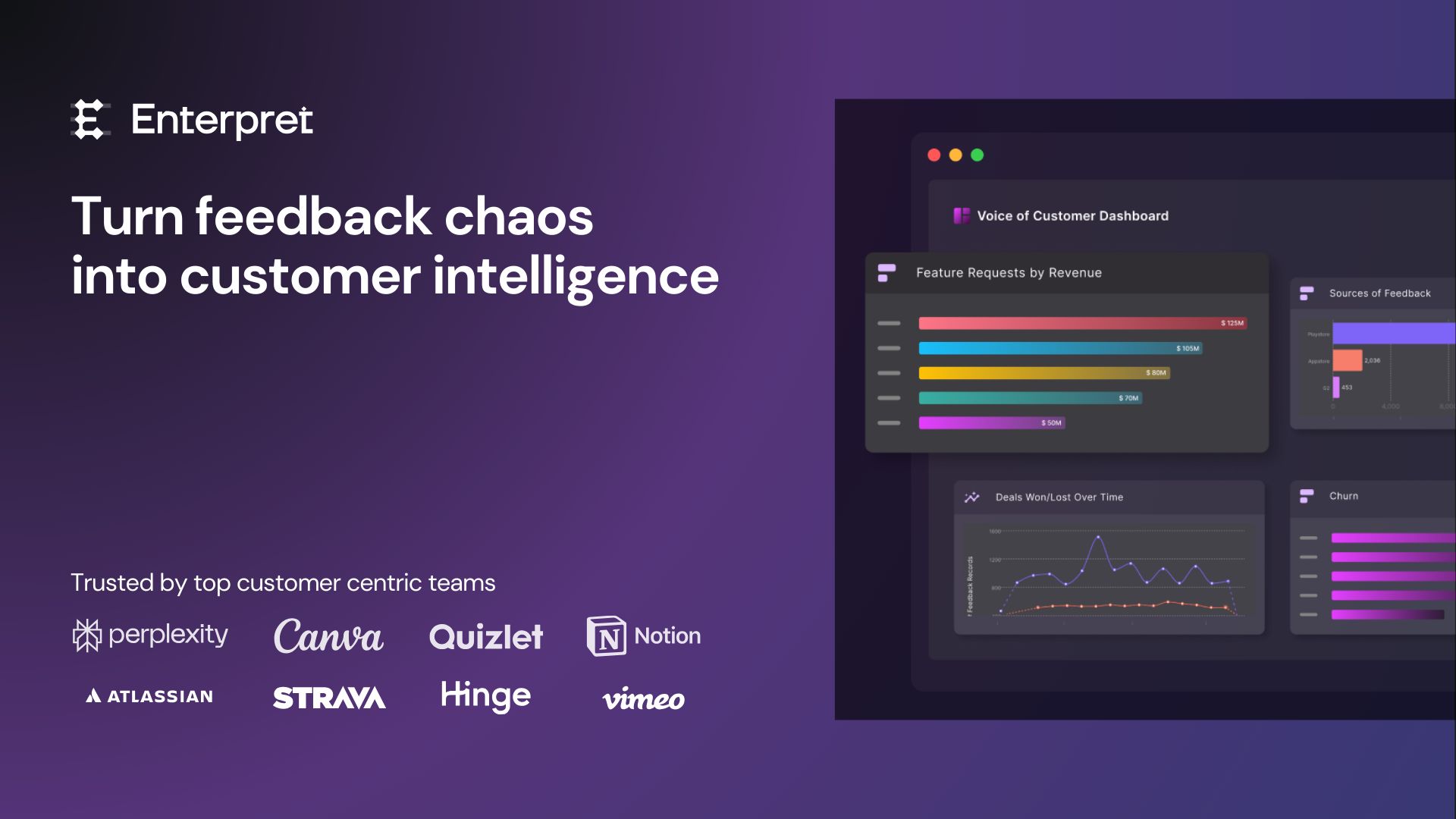
Enterpret unifies all your customer interactions, auto-tags themes, surfaces insights and ties them to key business metrics like revenue and CSAT. This helps you turn feedback chaos into clearer priorities that drive roadmaps, retention and revenue.
→ Canva: instantly surfaces top requests from user feedback across 220 million users and 100+ languages.
→ Perplexity: gets real-time alerts on revenue-impacting issues, cutting diagnosis time by hours.
→ Notion: 4x faster user insights reporting.

A Cat’s Commentary
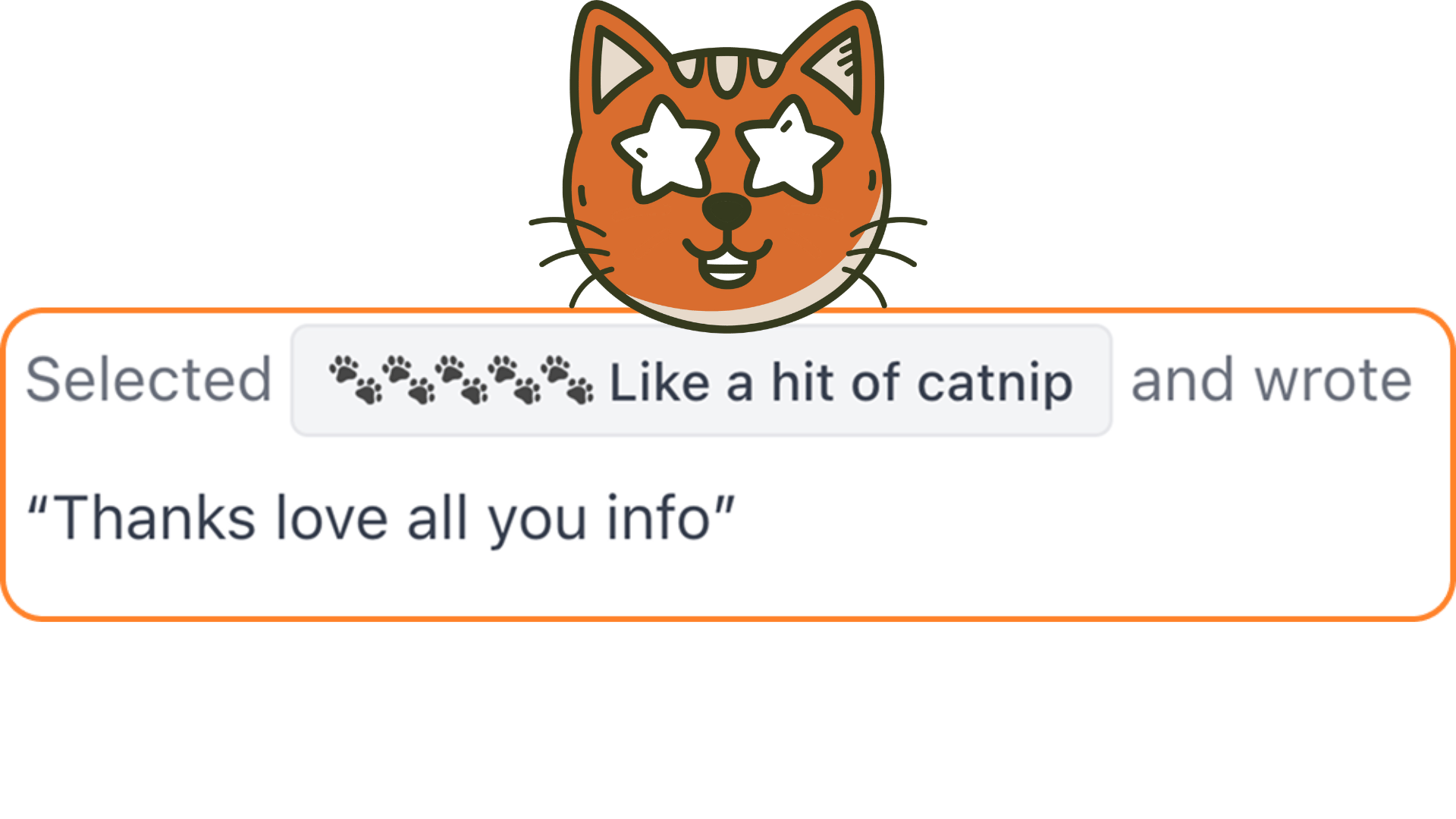


.jpg)

.jpg)


